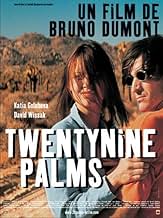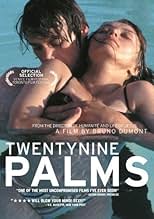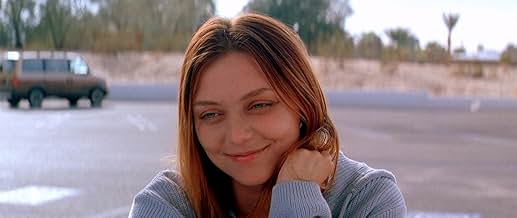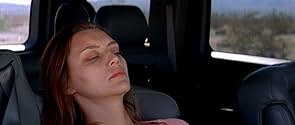IMDb रेटिंग
5.1/10
5.3 हज़ार
आपकी रेटिंग
अपनी भाषा में प्लॉट जोड़ेंDavid, an American photographer, and his Russian girlfriend Katia are scouting locations for a photo shoot. During the day, they drive through some of the wildest, most bizarre desert landsc... सभी पढ़ेंDavid, an American photographer, and his Russian girlfriend Katia are scouting locations for a photo shoot. During the day, they drive through some of the wildest, most bizarre desert landscapes, but their luck begins to run out.David, an American photographer, and his Russian girlfriend Katia are scouting locations for a photo shoot. During the day, they drive through some of the wildest, most bizarre desert landscapes, but their luck begins to run out.
- निर्देशक
- लेखक
- स्टार
- पुरस्कार
- 1 जीत और कुल 2 नामांकन
Yekaterina Golubeva
- Katia
- (as Katia Golubeva)
फ़ीचर्ड समीक्षाएं
This film is perhaps one of the most disconcerting and original film to discuss the potential for dislocation and horror that lies in all male-female sexual relationships. In the manner of one of the best modernist road movies (Two Lane Black Top), it strips all the unnecessary and hackneyed elements of narrative (e.g. standard horror or romance "tropes" often employed in the couple road movie) and both transcends the level of most other films, and simultaneously creates a far more convincing and natural reality through its controlled pacing, lack of narrative contrivance, its central performances and its perfectly composed photography.
As usual, Dumont's psycho-philosophical concerns are the ultimate "point" of the film, and it is essential that these are at least partially understood in order to appreciate the film. Some of these, once again, are notions (I believe) about the essentially selfish, violent "animal" nature of the way most humans think, particularly men, and the way this explains the insatiable human appetite to murder and screw. The final link that is made between horrific random brutality and the central man's sexuality is thereby horribly significant, and in no way simply an attempt to shock an audience simply for the sake of shocking an audience. A shock is of course intended, but to make an interesting point that challenges a complacently liberal optimist view of human nature/behaviour. It also provides a perfectly significant and unpleasant climax to Dumont's uneasy journey into the amorality and horror of male-female relations and human behaviour.
It's disheartening and yet inevitable that this film is not generally recognised as a brilliant piece of work. Whereas Bresson is now recognised as a master, Dumont is a new master and many of the comments here reflect the fact that his work has been predictably misunderstood. Many people display an obvious and almost deliberate confusion at his method and his choices, not being prepared to do any work to engage with the film or to accept that these are indeed artistically valid choices/ a method. Instead of seeing the its originality as refreshing, they are simply irritated by any the fact that it doesn't play the expected "game" to make it another easily-consumed-and-forgot piece of cinema, or a superficial piece of shock/extreme cinema like Noe's overpraised homage to 70s exploitation cinema with added French pretentiousness. Blinkered by their limitations, they can only judge it as a failure because it fails to fulfill their expectations and does not conform to what what they "know" or imagine to be good in film - a fulsome if rather predictable narrative packed with event, lots of theatrical, snappy dialogue (e.g. Noe's ludicrous racist dialogue that strikes me completely over-the-top and or his character's stale cod-philos. speeches) that is actually horribly predictable and rather dull, "good" acting (i.e. emotional, though unrealistic performances which encourage either empathy or hatred for the character, acted with theatrical charisma or self-conscious villainy, such as Noe's rapist). But then, as Dumont realises, most people are not capable of using cinema for doing anything more than indulging their appetite for sex, food and violence... and this is is what most cinema provides a simulated escape into, without the risk of getting caught.
As usual, Dumont's psycho-philosophical concerns are the ultimate "point" of the film, and it is essential that these are at least partially understood in order to appreciate the film. Some of these, once again, are notions (I believe) about the essentially selfish, violent "animal" nature of the way most humans think, particularly men, and the way this explains the insatiable human appetite to murder and screw. The final link that is made between horrific random brutality and the central man's sexuality is thereby horribly significant, and in no way simply an attempt to shock an audience simply for the sake of shocking an audience. A shock is of course intended, but to make an interesting point that challenges a complacently liberal optimist view of human nature/behaviour. It also provides a perfectly significant and unpleasant climax to Dumont's uneasy journey into the amorality and horror of male-female relations and human behaviour.
It's disheartening and yet inevitable that this film is not generally recognised as a brilliant piece of work. Whereas Bresson is now recognised as a master, Dumont is a new master and many of the comments here reflect the fact that his work has been predictably misunderstood. Many people display an obvious and almost deliberate confusion at his method and his choices, not being prepared to do any work to engage with the film or to accept that these are indeed artistically valid choices/ a method. Instead of seeing the its originality as refreshing, they are simply irritated by any the fact that it doesn't play the expected "game" to make it another easily-consumed-and-forgot piece of cinema, or a superficial piece of shock/extreme cinema like Noe's overpraised homage to 70s exploitation cinema with added French pretentiousness. Blinkered by their limitations, they can only judge it as a failure because it fails to fulfill their expectations and does not conform to what what they "know" or imagine to be good in film - a fulsome if rather predictable narrative packed with event, lots of theatrical, snappy dialogue (e.g. Noe's ludicrous racist dialogue that strikes me completely over-the-top and or his character's stale cod-philos. speeches) that is actually horribly predictable and rather dull, "good" acting (i.e. emotional, though unrealistic performances which encourage either empathy or hatred for the character, acted with theatrical charisma or self-conscious villainy, such as Noe's rapist). But then, as Dumont realises, most people are not capable of using cinema for doing anything more than indulging their appetite for sex, food and violence... and this is is what most cinema provides a simulated escape into, without the risk of getting caught.
This is one of those films where "nothing happens", where the frame stands as a window into the world of tedium. It's contrasted against this humming nothingness, mirrored in the film in the empty stretches of desert, that the small gestures can reverberate outwards to the eternal, to give us a portrait of life as we might know it by our own existence, elsewhere, in some other time.
These fleeting human moments, painful or exhilarating in their small profundity, largely make the film for me. A man stealing a glance at a passing girl in a diner, glance which may or may not be casual or mean something else, and which makes the woman sulk in jealous consternation. The woman trying to penetrate the hard, unyielding, demeanor of the man, asking him as he drives what is he thinking, the man saying nothing. The irritable tantrum of the man when their car won't go any further in a dirt road, that reveals the male child inside, petulant and impotent at the sight of failure.
Elsewhere Dumont fails to cut as incisively. The contrast he gives us in the first pool scene, "do you love me?", "do you like my penis?", is simpleminded at best.
The film works despite all that, first as a tangible reminder of the meaninglessnes of craving, here in the form of carnal animal sex that needs to be consumated, almost exorcised, the moment it builds. The nothingness of Dumont's desert world is not the shunyata of the Buddhists though, a realization of the world in true form. Rather it's a limbo where souls in disconnect aimlessly drag their feet yearning for a sense of direction or purpose when the only sense possible is a sense of still time. This shines for me in the latenight scene where David finds Katia sitting by herself at the side of the macadam, they seem like they're washed ashore in some other plain of existence. A pall of simmering, unspeakable, violence hangs over this like the shifting rents of dust in a dirt road, so that at least a breaking point can be surmised to be waiting at the other end.
Then it works for me as a painful vehicle that brings us at the brink of the existential void. I'm not very enamored of the act of random cruelty that makes this possible, the randomness makes sense yet at the same time it's so easy as to be schematic, but the monster that emerges on the other end is a shocking sight to me because I have the memory of the flawed human being that used to be.
The dysfunction of the protagonists then, foremostly human, also foreshadows doom. That malaise we see but small traces of in their behavior must exist out there too, in the rest of the world that is largely kept from our eyes.
Dumont doesn't dare go any further than this, that is if we accept there is somewhere to go, but as an agnostic lament it goes far enough.
These fleeting human moments, painful or exhilarating in their small profundity, largely make the film for me. A man stealing a glance at a passing girl in a diner, glance which may or may not be casual or mean something else, and which makes the woman sulk in jealous consternation. The woman trying to penetrate the hard, unyielding, demeanor of the man, asking him as he drives what is he thinking, the man saying nothing. The irritable tantrum of the man when their car won't go any further in a dirt road, that reveals the male child inside, petulant and impotent at the sight of failure.
Elsewhere Dumont fails to cut as incisively. The contrast he gives us in the first pool scene, "do you love me?", "do you like my penis?", is simpleminded at best.
The film works despite all that, first as a tangible reminder of the meaninglessnes of craving, here in the form of carnal animal sex that needs to be consumated, almost exorcised, the moment it builds. The nothingness of Dumont's desert world is not the shunyata of the Buddhists though, a realization of the world in true form. Rather it's a limbo where souls in disconnect aimlessly drag their feet yearning for a sense of direction or purpose when the only sense possible is a sense of still time. This shines for me in the latenight scene where David finds Katia sitting by herself at the side of the macadam, they seem like they're washed ashore in some other plain of existence. A pall of simmering, unspeakable, violence hangs over this like the shifting rents of dust in a dirt road, so that at least a breaking point can be surmised to be waiting at the other end.
Then it works for me as a painful vehicle that brings us at the brink of the existential void. I'm not very enamored of the act of random cruelty that makes this possible, the randomness makes sense yet at the same time it's so easy as to be schematic, but the monster that emerges on the other end is a shocking sight to me because I have the memory of the flawed human being that used to be.
The dysfunction of the protagonists then, foremostly human, also foreshadows doom. That malaise we see but small traces of in their behavior must exist out there too, in the rest of the world that is largely kept from our eyes.
Dumont doesn't dare go any further than this, that is if we accept there is somewhere to go, but as an agnostic lament it goes far enough.
This film is about tragedy, rape, and murder. It is not a romantic film, it is not a horror film, it is just a film about the most depressing aspects and results of really bad consequences. It is a seriously messed up film. One that I only could stomach once. I mean, this film is sad stuff. It is well acted by the two leads, but to really grasp the nature of it, you're just going to have to watch it to see what I mean. To tell you anything about the climax would be ruining a very unwholesome and devastating experience. I couldn't even sleep after watching this. I can't say that it's just simply really disturbing. It hits way deeper than that. It's just, wow. It hits hard. I recommend it to people who are open minded about their films and about the possibilities of films like these.
While working in the California desert, French auteur Bruno Dumont (Flanders, Humanite, The Life Of Jesus) "suddenly became afraid." Thus blossomed Twentynine Palms, a mesmerizing, allegorical, terrifyingly unclassifiable foray into the Mojave and the problematic center of Yeats' The Second Coming.
Ostensibly, Palms is the story of an American photographer, David (David Wissak) and his European girlfriend, Katia (Yekaterina Golubeva of Leos Carax's Pola X) on assignment in the Joshua Tree desert. Hobbled by a Babelish communication barrier, their interaction limited to sex, and a mutual, rapidly disintegrating co-dependence, the couple is moving deeper into no-man's land on some kind of aimless and encroachingly sinister vision quest.
An exquisite road picture interspersed with long pockets of drifting, expansive dreaminess, Palms has moments of serenity and meditative calm. But make no mistake: it's moving closer to something awful in every frame, its sense of what's approaching disarmed rather than exacerbated by the landscape the opposite strategy of pictures like Peter Weir's Picnic At Hanging Rock, another brilliant nature film in which the natural world becomes oppressive and claustrophobic despite the freedom of sky and open spaces. The film benefits enormously from the perfect physical appearance of its leads: Wissak has alarming eyes and a face that seems to have disaster imprinted into it...one of the most brilliant achievements of the film is the way the faces of both leads keep fluctuating from dead to alive, without any noticeable outward changes in makeup or lighting.
The concept of Palms as a love story, as some have called it, falls hard. The film is loaded with sex intense, wailing, despairing sex that foreshadows in every way the horror that is to come at movie's end, though exactly what kind of a statement Dumont was trying to make with this remains unclear; one is inevitably moved to question his motives in the same way many questioned Gaspar Noe's in Irreversible (a film to which Palms has been infrequently compared). But Dumont's superb sense of artistry and restraint has noting is common with Noe's adolescent appropriation of philosophies too sophisticated for him and his fascination with cruelty and sadism cloaked in frantic & flashy concept art. Instead, Twentynine Palms presents us with the problem of evil accompanied by a sense of profound and deep sorrow, a mourning for a fate that may or may not be implied as inexorable, playing out under the unchanging beauty of land and sky.
Ostensibly, Palms is the story of an American photographer, David (David Wissak) and his European girlfriend, Katia (Yekaterina Golubeva of Leos Carax's Pola X) on assignment in the Joshua Tree desert. Hobbled by a Babelish communication barrier, their interaction limited to sex, and a mutual, rapidly disintegrating co-dependence, the couple is moving deeper into no-man's land on some kind of aimless and encroachingly sinister vision quest.
An exquisite road picture interspersed with long pockets of drifting, expansive dreaminess, Palms has moments of serenity and meditative calm. But make no mistake: it's moving closer to something awful in every frame, its sense of what's approaching disarmed rather than exacerbated by the landscape the opposite strategy of pictures like Peter Weir's Picnic At Hanging Rock, another brilliant nature film in which the natural world becomes oppressive and claustrophobic despite the freedom of sky and open spaces. The film benefits enormously from the perfect physical appearance of its leads: Wissak has alarming eyes and a face that seems to have disaster imprinted into it...one of the most brilliant achievements of the film is the way the faces of both leads keep fluctuating from dead to alive, without any noticeable outward changes in makeup or lighting.
The concept of Palms as a love story, as some have called it, falls hard. The film is loaded with sex intense, wailing, despairing sex that foreshadows in every way the horror that is to come at movie's end, though exactly what kind of a statement Dumont was trying to make with this remains unclear; one is inevitably moved to question his motives in the same way many questioned Gaspar Noe's in Irreversible (a film to which Palms has been infrequently compared). But Dumont's superb sense of artistry and restraint has noting is common with Noe's adolescent appropriation of philosophies too sophisticated for him and his fascination with cruelty and sadism cloaked in frantic & flashy concept art. Instead, Twentynine Palms presents us with the problem of evil accompanied by a sense of profound and deep sorrow, a mourning for a fate that may or may not be implied as inexorable, playing out under the unchanging beauty of land and sky.
A three-legged dog, a dead body lying naked in the middle of the desert, a cop on his walkie-talkie calling for backup and a road block miles from the nearest inhabitant. These and other bizarre things show up in Twentynine Palms, the latest film by Bruno Dumont (La Vie de Jesus, L'Humanite). It is essentially a horror film that might easily be called "Scream 4". The opening scenes are beautiful and serene. David (David Wassik), an independent photographer from Los Angeles, and Katia (Katia Golubeva), a young woman without work, travel in a red 4X4 Hummer toward the vast California desert preparing to do a photo shoot for a magazine near the Joshua Tree National Park. The road leads to a motel in the city of 29 Palms, a desert oasis that in the film consists of one gas station, one hotel, and a swimming pool. Dumont says that he filmed in the U.S. rather than his native France because he "
felt the need to change space, ingredients, colors... and it is while filming in California that I had a true shock". The shock extends to the viewer as well.
There is little dialogue or action in the conventional sense. The communication between the couple is complicated by the absence of a common language: he speaks English, she only speaks French. What conversation exists is trapped in a level of superficial banality. The lovers explore the desert in their 4X4 and are focused entirely upon their own pleasure, seemingly defined by their sexuality. They swim in the motel pool, watch game shows on television, eat, make love in the middle of the desert, eat some more, argue and make up, then make love some more, all shown in explicit detail. Everything is familiar, a slice of typical Americana, yet nothing is as it seems.
Little by little the milieu becomes oppressive; a quiet and incoherent fear begins to settle in, an abstract fear because as Dumont says, "there is no reason to be afraid." At the end, nothing can fill the emptiness but destruction. The contrast between the poetry of nature and the constricted range of the human experience is clear. In this world without a spiritual core, the screams of pain and screams of delight are indistinguishable and anguish has the same meaning as pleasure. According to Dumont, "There is at the same time the bliss of pure happiness and absolute horror, the capacity to generate the two extremes: the hyper violence and the hyper pleasure. This is a couple that lives for pure pleasure and that will be led into abomination."
One cannot be neutral about a Bruno Dumont film (many people walked out during the Vancouver showing). His audiences are polarized between those who love and those that detest his films and the director seems disinterested in reconciling the two. I found this film extremely difficult to watch and even harder to be emotionally engaged with the characters. Dumont tests our endurance with scenes of brutal violence, making no concession to our sensibilities. In bringing us face to face with our worst nightmare, however, he forces us out of our state of emotional detachment and compels us to react, not with our minds or even our hearts, but viscerally with the totality of our being. Far removed from the pre-digested package cinema of Hollywood, Dumont has made an important statement about American values. The question must be asked however -- with films like Twentynine Palms that are so off-putting, will there be anyone who notices?
There is little dialogue or action in the conventional sense. The communication between the couple is complicated by the absence of a common language: he speaks English, she only speaks French. What conversation exists is trapped in a level of superficial banality. The lovers explore the desert in their 4X4 and are focused entirely upon their own pleasure, seemingly defined by their sexuality. They swim in the motel pool, watch game shows on television, eat, make love in the middle of the desert, eat some more, argue and make up, then make love some more, all shown in explicit detail. Everything is familiar, a slice of typical Americana, yet nothing is as it seems.
Little by little the milieu becomes oppressive; a quiet and incoherent fear begins to settle in, an abstract fear because as Dumont says, "there is no reason to be afraid." At the end, nothing can fill the emptiness but destruction. The contrast between the poetry of nature and the constricted range of the human experience is clear. In this world without a spiritual core, the screams of pain and screams of delight are indistinguishable and anguish has the same meaning as pleasure. According to Dumont, "There is at the same time the bliss of pure happiness and absolute horror, the capacity to generate the two extremes: the hyper violence and the hyper pleasure. This is a couple that lives for pure pleasure and that will be led into abomination."
One cannot be neutral about a Bruno Dumont film (many people walked out during the Vancouver showing). His audiences are polarized between those who love and those that detest his films and the director seems disinterested in reconciling the two. I found this film extremely difficult to watch and even harder to be emotionally engaged with the characters. Dumont tests our endurance with scenes of brutal violence, making no concession to our sensibilities. In bringing us face to face with our worst nightmare, however, he forces us out of our state of emotional detachment and compels us to react, not with our minds or even our hearts, but viscerally with the totality of our being. Far removed from the pre-digested package cinema of Hollywood, Dumont has made an important statement about American values. The question must be asked however -- with films like Twentynine Palms that are so off-putting, will there be anyone who notices?
क्या आपको पता है
- ट्रिवियाCasting Director Elisabeth Jereski originally planned to cast Marine Corporal Joshua James in the lead, but was rebuffed by his local Squadron Commander, Lt. Col. F.J. Usry, as the graphic sex scenes and violence would portray the Marine Corps, with which James was actively serving in 29 Palms, in a "less than positive light in the community."
- कनेक्शनFeatured in Kinomagazin: Das Schöne ist mein Dämon - Der Filmemacher Bruno Dumont (2007)
- साउंडट्रैकAkata Sun Dunchi
Performed by Takashi Hirayasu and Bob Brozman
Written by Takashi Hirayasu
Instrumental arrangements by Takashi Hirayasu and Bob Brozman
Published worldwide by Riverboat (UK) Music
Under license from World Music Network
टॉप पसंद
रेटिंग देने के लिए साइन-इन करें और वैयक्तिकृत सुझावों के लिए वॉचलिस्ट करें
- How long is Twentynine Palms?Alexa द्वारा संचालित
विवरण
- रिलीज़ की तारीख़
- कंट्री ऑफ़ ओरिजिन
- आधिकारिक साइटें
- भाषाएं
- इस रूप में भी जाना जाता है
- 29 palmas - Pasiones salvajes
- फ़िल्माने की जगहें
- उत्पादन कंपनियां
- IMDbPro पर और कंपनी क्रेडिट देखें
बॉक्स ऑफ़िस
- US और कनाडा में सकल
- $54,523
- US और कनाडा में पहले सप्ताह में कुल कमाई
- $12,870
- 11 अप्रैल 2004
- दुनिया भर में सकल
- $1,67,999
इस पेज में योगदान दें
किसी बदलाव का सुझाव दें या अनुपलब्ध कॉन्टेंट जोड़ें





















